Dubai recently hosted the world’s largest Islamic Economic conference. To mark this occasion, a week long series of events and activities was held leading up to the two day conference, themed on “A Shared Future”. The summit brought together a variety of speakers and influencers from around the world to share their insights and experiences in topics ranging from social impact entrepreneurship, utilizing block chain to building capacity for the fourth industrial revolution.
In a world where economies seem to be stagnating, forecasts are predicting spending power by the Muslim population of 1.6 Billion to rise to a whopping 2.6 trillion USD by 2020. Let that sink in!
One of the highlights at the beginning of the summit was when my friend Kamraan Siddiqui recieved an award for his company; Holiday Bosnia, which promotes Muslim style travel in postwar Bosnia. This aims to bring people together by combining tourism with philanthrophic and peace building initiatives. The award was presented by Crown Prince of Dubai and Chairman of The Executive Council, His Highness Sheikh Hamdan bin Mohammed bin Rashid Al Maktoum. Everyone remembers the marathon runner at the finishing line but does anyone stop to think of the effort leading up to the win? I do. I could not have been prouder for this gentleman. Hard work paid off.
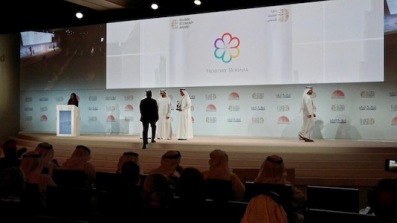
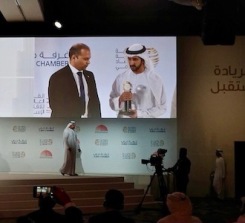
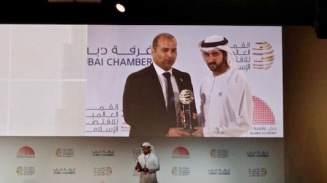
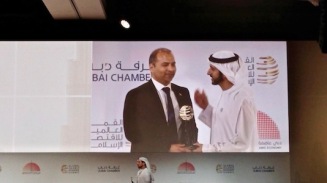
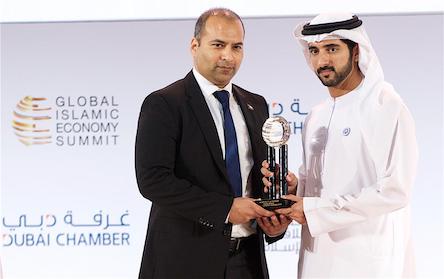
Kamran Siddique – CEO Holiday Bosnia presented with award by Crown Prince of Dubai and Chairman of The Executive Council His Highness Sheikh Hamdan
What caught my attention was the depth of ideas and the variety of initiatives that were being presented in contributing to the welfare of the Muslim population. A kaleidoscope of thoughts sprang in my mind as the speakers took part in shaping the ideas of the future. Not just ideas but ideas that were being implemented. It was refreshing to witness the below panelists speak of their stories with such passion. The energy was contagious.
We had Thaslima Begum, founder of TEEK TAKA, a blockchain platform that would revolutionize transparency and sustainability in global supply chains. Thaslima’s emphasis was helping the garment workers of her native Bangladeshi community have a transparent system in place; one where the workers were to receive fair wage payments, contract hours and safe working conditions through her concept of digital identities. Thaslima emphasized that being innovative was key in todays changing markets. It was interesting to note how global corporations would now be more accountable for their actions through technology and how the global supply chain model would need to be reevaluated. Sustainability to the core. Watch this space people.
Hadi Partovi CEO of the education non-profit Code.org demonstrated his passion in computer science through the use of coding and how his program had established computer science classes in 25% of US classrooms, created the most popular curriculum platform for K-12 computer science, and launched the global Hour of Code movement that has reached over 100 million students. Wow. For someone like me who is not into tech as such, Hadi made coding sound very cool. Hadi mentioned how change is inevitable and that it has happened over the centuries and that although automation was occurring in industries such as transport and manufacturing, people should adapt to this and be innovative in their approach. With the advent of driverless cars, people would be able to live further away from the cities which meant (A) people would have time to do other things whilst traveling (B) build more communities as a result. Will history repeat itself? 100 years ago, there was an automation process with the arrival of the motor car. There are many pros and cons with the advent of Artificial Intelligence and there are many uncertainties that lay ahead. Hadi went on to state, humans had the capability to innovate, take for example the cattle rancher who was able to develop an app that would allow them to count their cattle! They would then be able to sell that product to other farmers too! This topic could go on forever. What a gifted human being Hadi is! Artificial intelligence has a contender!
I don’t even know where to begin with Mohammad Raafi Hossain! Mohammad has a number of diverse accolades and awards to his name; too many to mention! From being an entrepreneurial-minded strategist to being founder of Finocracy to being advisor to the UAE Prime Minister’s Office where he advises across several portfolios including the World Government Summit and Artificial Intelligence; the list goes on. And yet amidst all his attributes, he spoke with such humility and conviction. Mohammad’s emphasis was that technology needed to be embraced; it was inevitable that change would happen. Mohammed further went on to add that revamping of the education system was of paramount importance as the jobs of tomorrow would require a different set of skills sets. Would this happen and at what pace?
And then we had Mokhtar Al Khansali, founder of Port of Moka. To listen to Mokhtar speak so passionately about his background resonated with me. In between two worlds like most second generation children of the diaspora, Mokhtar had a yearning to reach out to his roots and to bridge the gap between history and modernity. Originally from Yemen and living in Brooklyn, Mokhtar spoke of how he intended to revive his ancient heritage of coffee cultivation tracing back 5 hundred years ago. Even from afar, I could feel the zeal in his voice as he spoke of how he wanted to help his community through his social enterprise scheme; one bean at a time through technology. Oh and escaping the war in Yemen too in the process! Mokhtar spoke of how technology allowed the consumer to understand the process of coffee cultivation and the steps taken in a transparent way. Utilizing social media platforms, Mokhtar mentioned how he was able scale up the business by providing opportunities to a generation of tech savvy individuals who had lost their jobs in the cities and had come back to the villages to work on the coffee farms. This also enabled a cross cultural experience to unfold to the world as consumers were able to get a glimpse of the real Arab world as opposed to the one witnessed through the media. When you get the chance, have read his book The Monk of Mokha. Wow. I felt like taking a leaf out of his book and reinforce my own endeavour to help my own communities.
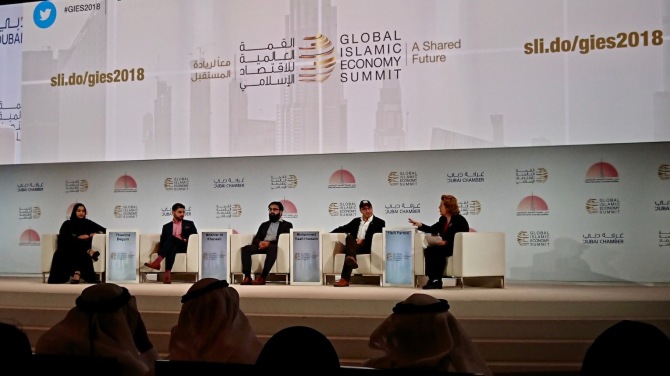
Hashim Farooq, founder of Wisekai spoke eloquently of connecting communities through their skill set through his platform; Wisekai. The ability to connect people with a skill set that could be transferred to someone who required it was warmly received. Hashim further spoke of how teaching a skill, a craft, or experience would enhance engagement and cultivate cohesiveness amongst the communities through technology and that was his ultimate goal; community empowerment. It was also imperative that curriculums at schools be amended to adapt to the rapidly changing circumstances and that when events were to set in motion with the advancement in technology, individuals could be empowered. A case in point was people in retirement who could nurture the younger generation with their life long skills set. Imagine having nurseries built next to retirement homes and then imagine the transfer of knowledge not to mention the outpouring of love of the elderly to the future generations. There was much to explore on this matter as there was an abundance of knowledge that could be transferred and received. The world is their oyster. Literally.
Abdur Rahman Sayd, Executive Director of Algebra spoke of the prophetic communication as he conveyed the story of the encounter between the Prophet Muhammad (PBUH) and a native of Yemen. The gift of speech – the master of human connection was emphasized to a mellowed audience – listen, give, connect, imagine, invite and love. I could not help but feel in awe of his message and the way Abdur Rahman presented it. It actually reminded me of the film The Message” – the only aspect missing was the harmonious music in the background. In todays dynamics, be the work place or in general, the six points above are in need more than ever. What if we were to espouse those same points?
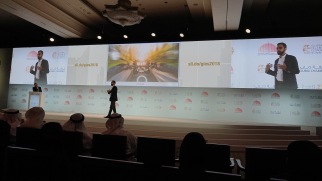
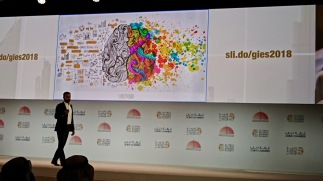
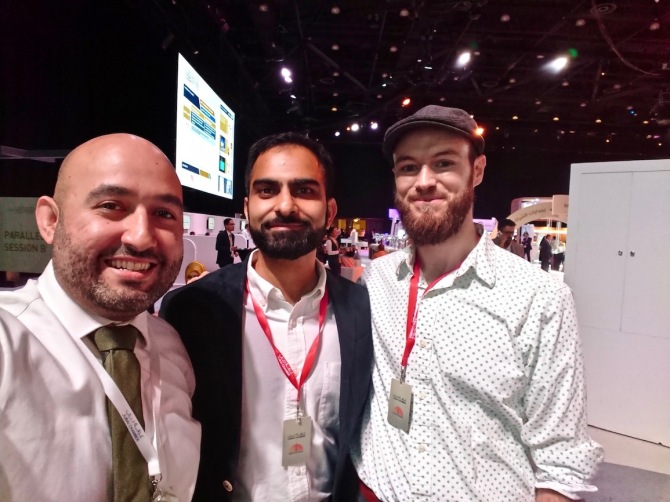
Cool in the gang! Hashim Farooq – Founder of Wisekay and Chris Blauvelt CEO & founder of LaunchGood.com, the world’s largest faith-inspired crowdfunding platform.
Moosa Khoori, Head of Sharia at Dubai Islamic Bank spoke passionately with an entertaining talk about integrating ones life purpose with one’s job role. As he engaged with the audience, Moosa elaborated on his personal journey of how having ditched the normal career paths of his fathers choosing; being a doctor, lawyer etc, he wanted to become a Sharia scholar and live a life with purpose. Having struggled in his career path as we all do, he came to a halt one day and notified his heads of department that he wished to resign. Moosa conveyed to his peers of how dissatisfied he was in his current role as he wasn’t fulfilling his dream; that of being a Sharia scholar. In Moosa’s eyes, a scholar was someone who attained knowledge at an advanced stage in all aspects and then practiced it. When it came to his realisation after his discussion with his peers that; he should seek knowledge and put it into practice, that he was a scholar already and that gaining knowledge and practicing it was an evolving process, Moosa found an altogether new surge of energy to focus on. I could feel it in his voice and I could only imagine this being divine revelation for him. A paradigm shift had occurred. In his engaging speech, Moosa mentioned how he was to reflect upon the above words of wisdom and doubled his efforts. The amalgamation of his passion for scholarly work in Sharia coupled with his engaging personality enabled him to then receive another promotion. Moosa would become the head of the department!
Having witnessed the success in his own life, Moosa took it upon himself to replicate this with his colleagues and channel their energies to fulfill their goals both on a personal and professional level. Imagine having employees of a company strive for excellence whilst combining their personal attributes and goals. A win – win situation both for the company and the individual. Moosa gave an example of how one of his employees wanted to be a lecturer and so Moosa went to task by putting the time, effort and energy – (a comprehensive strategy and implementation plan that he carved out over the evenings and weekends) and coached his colleague to fulfill his dream. His colleague became a lecturer and head of training and waved at us with a beaming smile. These were not just ideas but ideas worth implementing and sharing. A life worth living. Wow. When asked if this would contradict the corporate goals of the company, Moosa spoke with conviction “I’m not worried about people leaving the company if they will be happy somewhere else, the right people will come my way”. A round of applause erupted. Gods will I thought. I must say, I never came across anyone like Moosa before and the world needs more mentors/leaders like him. A pioneer. Bravo.
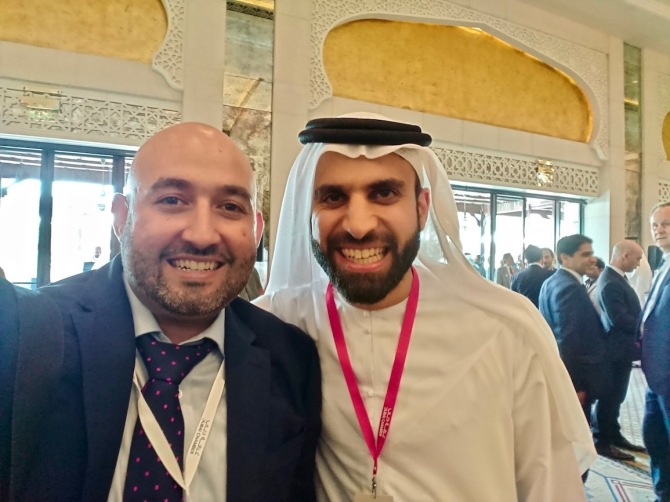
Pause for a moment with this gentleman – Moosa Khoory: Head of Sharia at Dubai Islamic Bank
Mohammed Faris, founder of Productive Muslim is another powerhouse to look out for with a number of accolades including being on the top 500 Most Influential Muslims list. With a background in public speaking and engaging with countless audiences in becoming the best versions of themselves through a strategy of integrating the spiritual, physical and social aspects of life, Mohammed was able to strike a chord with the audience. What defines an Islamic Economy leader? How do they stand out? Mohammed spoke passionately cultivating the next generation of leaders through the concept of the abundance mindset in business; that businesses were an amanah – a trust and that sustenance should be for all. Mohammed further went on to speak of how setting up Barakah university; the first of its kind would be key in leveraging and implementing the abundance mindset of values and rituals of the Islamic faith. A counter narrative to the status quo of the capitalist ideals which had caused much disparity. When asked by the moderator why this had not been envisaged before, I wanted to reply – “But it has” There are countless examples of Muslim businesses over the centuries who have operated a business with an ethical mindset. This was indeed a good reminder to me as it was to all of us.
Now if there was one person to get me emotional, it would have to be Helianti Hilman. Helianti spoke of the origins of JAVARA and had the audience pause as she broke down whilst conveying her experiences of rural farmers who were in desperation and hopeless. Helianti spoke of how she managed to gather the smallholder farmers together and nurtured them back into the market by creating a platform that would enable them to contribute their products and serve the domestic as well as international markets. What struck me was how humble Helanti was. Helanti even launched her very own Javara Academy – School of Food Artisans, enabling a platform for young farmers, foragers and fishermen to become food entrepreneurs, creating and selling added value products from their commodities. Now imagine if we could all do that in some way. There’s one way of giving back to the community through charity, theirs quite another to provide the community with the resources for them to come out of poverty with dignity. A prime example sustainability and more so of teaching people how to fish! Bravo.
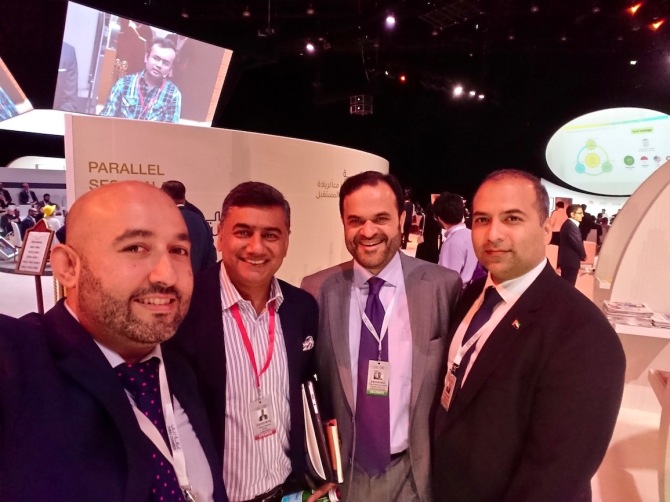
From left to right: Tariq Cheema – CEO World Congress of Muslim Philanthropists, Mohammad Rashid Ashraf – Secretary General of Pakistan Education Academy, Kamran Siddique – CEO Holiday Bosnia
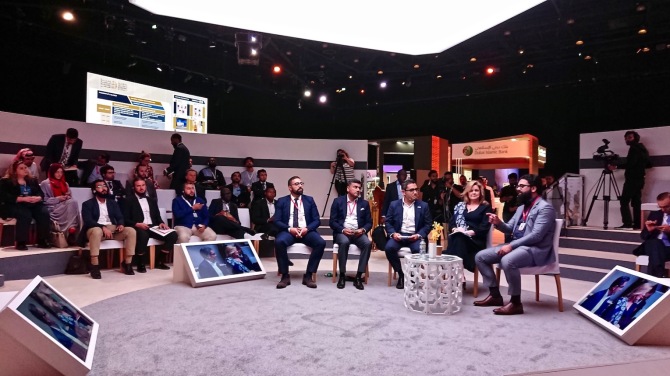
From left to right : Rachid Ouaich – Co-Founder of Conexcap, Tariq Cheema – CEO of World Congress of Muslim Philanthropists, Houssam Chahine – Head of Private Sector Partnerships at UNHCR, Kimberly Gire – Founder of Global Women Leaders Strategic Philanthropy, Mohammad Raafi Hossain – Founder of Finocracy
Talking of how to teach people how to fish, it was interesting to hear the above panelists speak on the topic of Islamic Philanthropy, Zakat and the role of technology. With the advent of social media platforms, individuals were more engaged than ever before. However, it was always a point of contention with donors; would the recipients receive the aid/zakat?
Various points were discussed including trust and transparency. With the emergence of FINTECH platforms such as Blockchain, this meant greater transparency to the donors, which could be provided all round as Mohammad Raafi Hossain stated. Blockchain technology would also reduce the admin charges too, which amounted to as much as 50% of the donation given. A holistic approach with respect to public / partnerships and the use of technology was discussed. The banking, public, governmental and humanitarian sectors could converge and operate as with the case on a project in Jordan where zakat was being received via text message. Moreover, Kimberly Gire – Founder of Global Women Leaders Strategic Philanthropy emphasized how technology could be used build multi-layer partnerships, one in which refinancing could be arranged on a particular project way before a crisis occurred.
Dr. Tariq Cheema, founder of the World Congress of Muslim Philanthropists presented the argument of the shortcomings of Islamic philanthropy; Muslims were very generous in giving; estimated in the billions but the impact was lagging behind. Dr. Tariq was of the view that a paradigm shift needed to be set in motion whereby giving was more faith inspired than faith-based, that there should be investments made to the recipients of aid in contrast to previous methods of reactive aid and firefighting. Providing the necessary tools to the recipients so they could empower themselves to get out of poverty was key. Having worked in the field of humanitarian activities in the past, Dr. Tariq’s thoughts resonated with me. It is important that recipients of aid be shown “how to fish” as opposed to keeping them in a dependency mode. There was clearly more room for input on this matter. I hope that the usage of technology will enable philanthropic causes to be fully effective to those that are in need.
A prime example of the use of technology for the greater good; something close to my heart having worked with children in conflict areas was demonstrated by Francesco Cavallari, Founder and President of Video Games Without Borders, a nonprofit organization. Cavallari spoke of how after 15 years of being in the games industry, he sought to use his skills sets and with the help of his team created a game app called Antura. The idea behind the game would allow children to build foundational literacy in Arabic and improve the psychological well – being for Syrian children and others displaced. Cavallari went on to state that with the cost of just one euro, children could learn how to read and write. It is no wonder then that he won first prize amidst stiff competition in the Islamic Creative Competition organized by Dubai Culture and Arts Authority in partnership with Dubai Islamic Economy Development Centre. Bravo.
Group discussions regarding the state of the muslim economy – How might we 10x the global economy of our shared future. Some interesting discussions arose and our group in particular presented how “Halal could be cool”
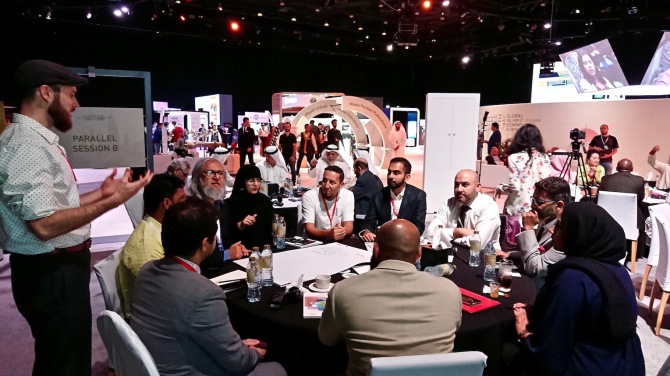
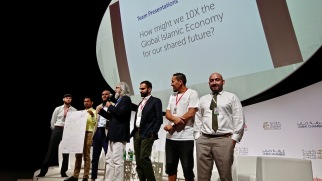
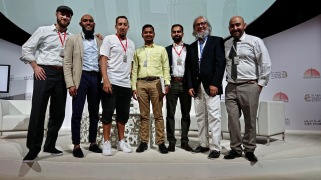
There was much to ponder and to take away from this event. I felt motivated, re-energized and inspired to see people with passion and a cause to fulfill. I could feel the energy and it was incredible. It is through endeavours like the above that humanity can evolve and it is imperative that we showcase more stories like this. It’s time we rose to the occasion through nurturing each other to make the world a better place. These are just some examples of the potential of what the Muslim community can envisage doing for the greater good. Lets nurture these bright minds with brighter ideas, champion them and assist them in whatever way possible for them to reach their goals of making a brighter future not just for the muslim community but for the world in general. Uplift rather than exploit for a shared future. Hope in Humanity restored.
A big thank you to Dubai Chamber of Commerce, ThompsonReuters and to all the sponsors, participants and last but not least Dubai for hosting this event.
*Information collated from Global Islamic Economic summit report.
Great article. Sustainability and innovation is the key to succes.